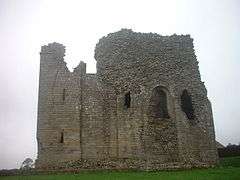Bowes
| Bowes | |
|---|---|
 Bowes Castle | |
 Bowes Bowes shown within County Durham | |
| Population | 471 (2011, including Gilmonby)[1] |
| OS grid reference | NY995135 |
| Unitary authority | |
| Ceremonial county | |
| Region | |
| Country | England |
| Sovereign state | United Kingdom |
| Post town | BARNARD CASTLE |
| Postcode district | DL12 |
| Dialling code | 01833 |
| Police | Durham |
| Fire | County Durham and Darlington |
| Ambulance | North East |
| EU Parliament | North East England |
| UK Parliament | |
Bowes is a village in County Durham, England. Located in the Pennine hills, it is situated close to Barnard Castle. It is built around the medieval Bowes Castle.
Geography and administration
Civic history
Bowes lies within the historic county boundaries of the North Riding of Yorkshire, but along with the rest of the former Startforth Rural District it was incorporated into the non-metropolitan county of Durham for administrative purposes on 1 April 1974, under the provisions of the Local Government Act 1972.
History
The Roman name for Bowes was Lavatrae. A Roman fort was located there, which was re-used as the site for Bowes Castle.
The place-name 'Bowes' is first attested in a charter of 1148, where it appears as Bogas. This is the plural of the Old English boga meaning 'bow', probably signifying an arched bridge.[2]
The village church is dedicated to St Giles.
The only pub in the village, The Ancient Unicorn,[3] is reputed to be haunted by several ghosts. This 17th-century coaching inn famously played host to Charles Dickens as he toured the local area. Dickens found inspiration in the village academy, which he immortalised as Dotheboys Hall in Nicholas Nickleby, and the graves of two of the people who inspired characters portrayed by the great author can be seen in Bowes churchyard to this day. William Shaw (1782-1850) was the headmaster of The Bowes Academy, and is said to have been the model for Wackford Squeers in Nicholas Nickleby – they share the same initials. And George Ashton Taylor, who died in 1822 aged 19, apparently inspired Dickens to create the character of Smike in the same novel.
From 1861 to 1962, the village was served by Bowes railway station.
Education
Bowes has a single primary school at the centre of the village, Bowes Hutchinson's C of E (Aided) Primary School.[4]
Notable people
Thomas Kipling (bap. 1745, d. 1822), dean of Peterborough, was born in Bowes.[5]
John Bailey (1750–1819), mathematician and land surveyor was born in Bowes.[6]
Richard Cobden (1804–65), manufacturer and politician, was schooled in Bowes.[7]
References
- ↑ "Parish population 2011". Retrieved 7 July 2015.
- ↑ Eilert Ekwall, The Concise Oxford Dictionary of English Place-names, p.56.
- ↑ The Ancient Unicorn
- ↑ Bowes Hutchinson's C of E (Aided) Primary School website
- ↑ Robert Hole, ‘Kipling, Thomas (bap. 1745, d. 1822)’, Oxford Dictionary of National Biography, Oxford University Press, 2004 accessed 2 May 2011
- ↑ T. F. Henderson, ‘Bailey, John (1750–1819)’, rev. H. K. Higton, Oxford Dictionary of National Biography, Oxford University Press, 2004 accessed 2 May 2011
- ↑ Miles Taylor, ‘Cobden, Richard (1804–1865)’, Oxford Dictionary of National Biography, Oxford University Press, 2004; online edn, May 2009 accessed 2 May 2011
External links
| Wikimedia Commons has media related to Bowes. |